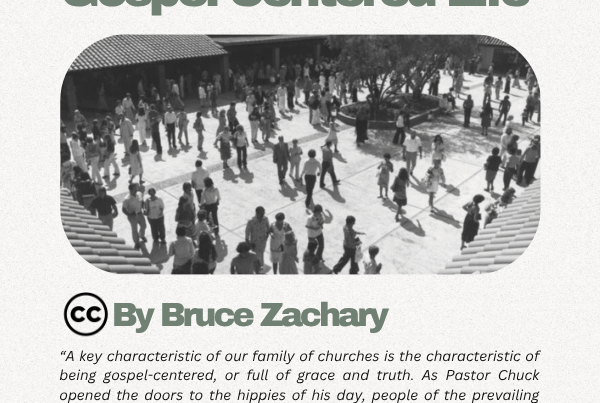
I remember as a young Christian reading through Isaiah and running into the passage where God says, “Behold my servant, whom I uphold, my chosen, in whom my soul delights” (Isaiah 42:1). I recall the feeling of despair that welled up in my chest as I said to myself, “I want to be that kind of a servant of the Lord, but I can’t!” As I continued reading, I realized an amazing truth: “This is not about me! It’s about Jesus!” As I began to understand that Jesus was the perfect Servant on my behalf, fulfilling what I never could, so that God’s soul would delight in me by His grace, my despair turned to joy and worship.
While I came to see that this particular passage was about Jesus, I did not yet understand then that the news was much better than I could imagine. Not only was this passage about Jesus; the whole Bible is about Jesus! After His resurrection, Jesus met two of His disciples on the road to Emmaus. They didn’t recognize Him and were dejected because Christ had been killed. But we read that Jesus rebuked them for their unbelief and then “…Beginning at Moses and all the Prophets, He expounded to them in all the Scriptures the things concerning Himself.” (Luke 24: 27).
The reality that allows our hearts to rejoice as we open the Word is that all of Scripture is about Christ.
We read in the gospel of John that Jesus is the eternal Word of God (John. 1:1,14). Since that’s the case, we should not be surprised to find that the primary goal of the written Word of God is to reveal to us the eternal Word, Jesus.
Now, many Christians have known since Sunday school that “Jesus” is the right answer to every question. Jesus is the hero of the Bible, the One who sets right all that was wrong, the One who rescues us. When we look at the Bible as a whole story—of creation, fall, redemption and restoration—we see that Jesus is the hero. But as pastors who seek to faithfully exposit the Word of God, the question for us becomes: Do our sermons reflect this wonderful, Christ-centered bearing of the Scriptures?
Who is the hero in our sermons? Sadly, too often, we present the Christian as the hero of the sermon rather than Christ.
Of course, none of us would ever say that we are the hero of the story. But when sermons are preached that put us and what we do center stage—our faithfulness, our courage, etc.—rather than Jesus and what He has done, we are essentially telling people that they are the hero. Just think of how many sermons you’ve heard (or preached!) about this or that Old Testament saint, his example of faith, and then the exhortation is given that we are to have faith like this saint. That is all true, but if our sermons end there, we have put our listeners and ourselves in the role of the hero. To summarize a challenge presented by Tim Keller: “If you can preach your sermon in a synagogue without getting chased out, it is not a Christian sermon.” I love that. If our sermons are just calls to emulate this or that spiritual virtue, we are not truly preaching Christian sermons. We don’t just need generic calls to “be faithful” or apply some bit of biblical advice to our lives. We need Christ Himself and nothing less.
The only possible result of putting the Christian at the center of our sermons rather than Christ is self-condemnation or self-reliance—neither of which is pleasing to God. For example, when we read about the story of Samson and are cautioned not to follow his foolish ways, to recognize the traps of the enemy, where lust takes us, etc.—these things are all true. But they are not enough to transform us. One person might acknowledge himself as being in the place of Samson and feel condemned with every word about Samson’s foolishness. Another will see the example of Samson and feel like he or she is better than that, or at least can be better than that, and will set about with a sense of resolve to be better. That will last a few days until this believer falls into one or the other temptation, and then he will join in the group of the self-condemned.
We need much more than an example. If that were all we needed, Christ’s coming would be unnecessary.
While the warnings in Samson’s story are very real, we must move beyond that and learn to see in this story the better Samson, Jesus, the One to whom all Scripture points. Like Samson, in Christ, we see a miraculously born Son upon whom the Spirit of the Lord came to raise Him up as a Deliverer for God’s people. He was faced with temptation but, contrary to Samson, overcame. He also gave Himself to be bound and led away for the sake of the ones He loved, and ultimately, gave His own life to destroy the enemies of God. Samson entered into sin and compromise not because he just needed to “be on guard,” but because he had turned sex and relationships into a false god. He believed that this would fill his desire for love and pleasure.
But when we see the truly loving Spouse, Christ, who was taken captive for the sake of His bride and who gave His life to conquer our enemies—only that can truly free our hearts from lesser lovers, to be enraptured with the only One who can satisfy. What our people (and we ourselves) need is not just practical tips for Christian living or spiritual pep talks. We need to see the all-satisfying fullness of Christ to whom the Word points. And when we do see the greatness of His love and the glory of His Gospel, we are freed from both condemnation and self-reliance. May Christ be the hero of our sermons, for that is the kind of sermon, which will truly transform our hearts.









